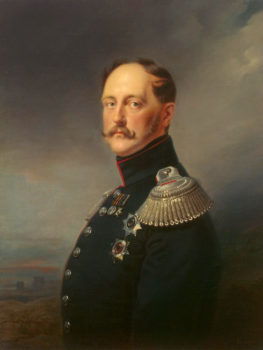Human Beings Are Not Bargaining Chips (Temple Beth Or)
“Tuvia’s mother was wailing and tearing her hair. His father was sobbing. His sisters were terrified. ‘Tuvia, my dear son,’ his mother cried. ‘My only boy, why are they tearing you away from me?’
Tuvia was taken, half-asleep, to a large house where many frightened, wide-eyed children were crying, ‘Mama, Mama. Take me home to my Mama!’ The children cried all that sleepless night.”
Larry Domnitch, The Cantonists: The Jewish Children’s Army of the Tsar, 79-80. Minor edits made for style.
These words might sound like they could be recently-written or the work of fiction; however, they actually come from the 19th-century and record real history. They describe the experience of a Jewish family from that era—Tuvia Silverman, his parents, and his sisters—at a time when Jewish parents were being forcibly parted from their young children. The separation of families it depicts (and these are Tuvia’s own words explaining what happened to him as a child) was the result of an anti-Semitic policies enacted by Tsar Nicholas the First.
For some background on the relevant 19th-century history: Tsar Nicholas the First was a man who, in 1816, wrote in his diary the following of Jews, whom he called by the pejorative name “Zhids”: “The ruination of the peasants of [Russia] is the Zhids. They are regular leeches and suck these unfortunate governments to the point of exhaustion.” In 1827, two years after becoming Tsar, Nicholas determined that he could break the will of the Jews by creating a compulsory quota of Jewish boys whom Russian Jewish communities would be forced to send away to the army. Boys as young as 8 years old were stolen away from their families for this reason and were sent off to the army for more than two decades at a time; Nicholas the First imagined that he could, in this way, work to rid Russia of Jews.
Nichols had some success in his sinister goal: the devastation felt by families whose children were taken was intense. He even succeeded in turning fellow Jews against one another: Jews were tasked with policing each other to ensure that conscription quotas were met, and, thus, an infamous role—the khapper—was born. Khappers were Jews who would kidnap Jewish boys, sometimes taking them from their beds in the middle of the night, to deliver them to the Russian government. Poor Jewish families were especially susceptible to having their children taken by khappers because they (unlike their more affluent peers) couldn’t afford to bribe those who might take their children.
Turning back to the present: Though, as an historian, I usually love to discover facets of history that are relevant to contemporary life, it is probably self-evident that this is an historical episode one would never hope to see paralleled in his or her own time. Nevertheless, I hope that the pain of this chapter of Jewish history can steer our own thoughts today. It should help to shape our consciences and to deepen our empathy for others.
The Jewish ethos, formed by our experiences throughout history, teaches unambiguously that there is no appropriate time or way to use any human being’s life as a bargaining chip for political or social ends. Regardless of the impact we might hope to have in doing things like this, Judaism does not sanction the political leveraging of children’s freedom or the separation of families.
Of course, every situation possesses its own nuances; what happens in 2018 is not identical to what happened in 1827. However, there are undeniable parallels between what was done to Jewish families in the past—as in 19th-century Russia—and what has been done to migrants recently in the United States. Nevertheless, doing justice to our Jewish history means ensuring that no person in the present ever re-experiences the indignities we as Jews once too commonly suffered; it means remembering that all human beings are created b’tzelem elohim, in the image of God; and being Jewish, as well, means fully feeling the pain of the other, and acting to protect those in need. Remember: we, too, were once strangers in a foreign land.

